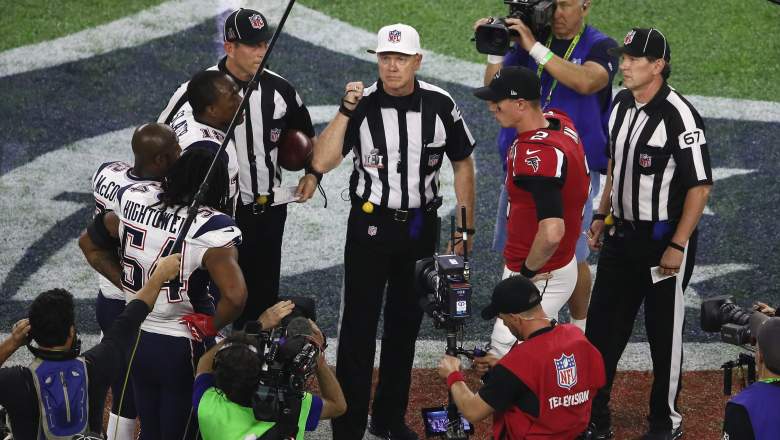
Getty The Patriots and Falcons await an overtime coin toss in Super Bowl 51.
The NFL playoff overtime rules are similar to the regular season with one main difference, a game cannot end in a tie. The game initially heads to a 10-minute overtime period and if the game is still tied it goes to another overtime period. During the regular season, both teams would be awarded a tie in the standings.
The first team to possess the ball in overtime can still win the game with a touchdown. In most circumstances, this means it is preferable to choose to receive the ball if a team wins the coin toss.
Unless a touchdown is scored on the first possession, both teams must possess the ball once. After both teams have possessed the ball, the first score wins the game. A field goal or safety can only win the game once both teams have been on offense at least once.
Here’s a look at the traditional overtime rules per NFL.com.
At the end of regulation, the referee will toss a coin to determine which team will possess the ball first in overtime. The visiting team captain will call the toss.
No more than one 10-minute period will follow a three-minute intermission. Each team must possess, or have the opportunity to possess, the ball. The exception: if the team that gets the ball first scores a touchdown on the opening possession.
Sudden death play — where the game ends on any score (safety, field goal or touchdown) — continues until a winner is determined.
Each team gets two timeouts.
The point after try is not attempted if the game ends on a touchdown.
If the score is still tied at the end of the overtime period, the result of the game will be recorded as a tie.
There are no instant replay coach’s challenges; all reviews will be initiated by the replay official.
During the NFL Playoffs, the Game Will Go Into a 2nd Overtime Period If the Contest Is Still Tied
Unlike the regular season, each playoff game must have a clear winner in order to advance in the playoff tournament. If the game is still tied at the end of one overtime period, the game will go into a second overtime period.
The second overtime period is treated similarly to when a game goes into the next quarter during regular play. There is only another coin toss if a third overtime period is required.
Here’s a full rundown of the NFL playoff overtime rules per NFL.com.
If the score is still tied at the end of an overtime period — or if the second team’s initial possession has not ended — the teams will play another overtime period. Play will continue regardless of how many overtime periods are needed for a winner to be determined.
There will be a two-minute intermission between each overtime period. There will not be a halftime intermission after the second period.
Another coin toss will be held before the third overtime period. The captain who lost the first overtime coin toss will either choose to possess the ball or select which goal his team will defend, unless the team that won the coin toss deferred that choice.
Each team gets three timeouts during a half.
The same timing rules that apply at the end of the second and fourth regulation periods also apply at the end of a second or fourth overtime period.
If there is still no winner at the end of a fourth overtime period, there will be another coin toss, and play will continue until a winner is declared.